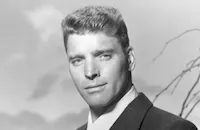ROD STEIGER, 1925 - 2002
From the docks of New York to the rural back roads of Mississippi to the war torn Russian steppes, Rod Steiger reveled in creating some of the most overpowering and difficult men on the screen. He could be a total scoundrel, embodying Machiavelli's idiom that "it's better to be feared than loved" in the movies. But as an actor he refused to be typecast and his wide range included characters who were secretly tormented (The Pawnbroker, 1965) or loners (Run of the Arrow, 1965) or eccentrics (The Loved One, 1965).
Along with Marlon Brando, Steiger helped bring the 'Method School' from the Group Theater and Actors Studio in New York to the screens of Hollywood. The Method technique, taught by Stella Adler and Lee Strasberg, insisted on complete immersion into the character's psyche and resulted in intense, dramatic performances and performers. Steiger made his first significant screen appearance as Brando's older brother in On the Waterfront (1954). Their climatic scene together in a taxicab is one of the great moments in American cinema.
It was a short leap from playing a crooked lawyer in On the Waterfront to playing the shady boxing promoter in The Harder They Fall (1956). Based on the tragic tale of true-life fighter Primo Carnera, The Harder They Fall details the corruption behind the scenes of professional boxing bouts. Steiger is a fight manager named Nick Benko who enlists newspaperman Eddie Willis (Humphrey Bogart in his final screen appearance) to drum up publicity for a fixed prizefight. While the boxing scenes were often brutally realistic, the most powerful dramatic moments took place between Steiger and Bogart on the sidelines.
As mob boss Al Capone (1959), Steiger got to play another man you loved to hate. He vividly depicted the criminal from his swaggering early days to his pathetic demise from syphilis. In Doctor Zhivago (1965), Steiger was the only American in the international cast, playing the hateful and perverse Komarovsky. During the production of Dr. Zhivago, Steiger often found himself at odds with director David Lean. Schooled in the British tradition, Lean valued the integrity of the script and demanded that actors remain faithful to the script. Steiger, on the other hand, relied on improvisation and spontaneity. When kissing the lovely Lara (played by Julie Christie), Steiger jammed his tongue into Christie's mouth to produce the desired reaction - disgust. It worked! While it might not have been Lean's approach, it brought a grittier edge to the prestige production and made Komarovsky is a detestable but truly memorable figure.
Steiger dared audiences to dislike him. As the smalltown southern Sheriff Gillespie in In The Heat of the Night (1967), Steiger embodied all the prejudices and suspicions of a racist. When a black northern lawyer, played by Sidney Poitier, arrives on the crime scene, Gillespie is forced to recognize his fellow man as an equal despite skin color. Here, Steiger's character started as a bigot and developed into a better man. He finally claimed a Best Actor Academy Award for his performance as Sheriff Gillespie.
Steiger was an actor's actor. A chameleon who didn't think twice about diving into challenging roles that others would shy away from. In the Private Screenings interview he did with host Robert Osborne he admitted that Paul Muni was one of his idols because of his total immersion into his roles. Steiger said, "I believe actors are supposed to create different human beings." And Steiger showed us a rich and diverse cross section of them.
by Jeremy Geltzer & Jeff Stafford
Cattle Annie and Little Britches
Brief Synopsis
Cast & Crew
Lamont Johnson
Burt Lancaster
John Savage
Rod Steiger
Diane Lane
Amanda Plummer
Film Details
Technical Specs
Synopsis
It's 1893, and after their many years together, the outlaw gang led by Bill Doolin and Bill Dalton is about to disband. But when two teenage girls filled with the romance of being outlaws in the West show up, the gang is revived. Jenny and Annie help the men plan a series of robberies, but this new activity draws the interest of a lawman who is determined to bring them all to justice.
Director
Lamont Johnson
Cast

Burt Lancaster
John Savage

Rod Steiger

Diane Lane
Amanda Plummer
Scott Glenn
Steven Ford
Ken Call
Redmond Gleeson
William Russ

Buck Taylor
Perry Lang
John Quade
John Sterlini
Tom J Delaney
Matthew Taylor
Michael Conrad
Roger Cudney
Chad Hastings
Yvette Sweetman
Mike Moroff
John Hock
Jerry Gatlin
Russ Hoverson
Crew
David Anderson
Colin Arthur
David Ball
David Ball
Dehl Berti
Sanh Berti
Sanh Berti
Bertha Chu
Laurencio Cordero
Jim Cranston
John Daly
Derek Dawson
Sean Doyle
Jesus Duran
Mark Eggenweiler
Tony Epper
David Eyre
Amy Fates
Jerry Gatlin
Stan Gilbert
Rosa Guerrero
William Haugse
David Hawkins
Hall Hitzig
Hall Hitzig
Rupert Hitzig
Johnny Hock
Russell Hoverson
Lester Hoyle
Earl Huntoon
Christopher Michael Johnson
Stan Jolley
Diane Katz
Alan King
David Korda
John Leblanc
Danne D Long
Mary Mccaslin
Sergio Ortega
Bernard F Pincus
Larry Pizer
Dick Purdy
Larry Randles
Rita Riggs
Jim Ringer
Robbe Roberts
Davey Rogers
Brian Rose
Gerald Rosenthal
Scott Sampson
Jonathan Schwartz
Tom Slocum
Tom Slocum
Tom Slocum
John Smallcombe
Beverly Spaulding
William Stevenson
Duncan Stewart
Manuel Topete
Robert Ward
Robert Ward
Bob Wright
Film Details
Technical Specs
Articles
TCM Remembers - Rod Steiger

TCM Remembers - Rod Steiger
Quotes
Trivia
Miscellaneous Notes
Released in United States 1981
Feature acting debut for actress Amanda Plummer, the daughter of Tammy Grimes and Christopher Plummer.
Released in United States 1981













